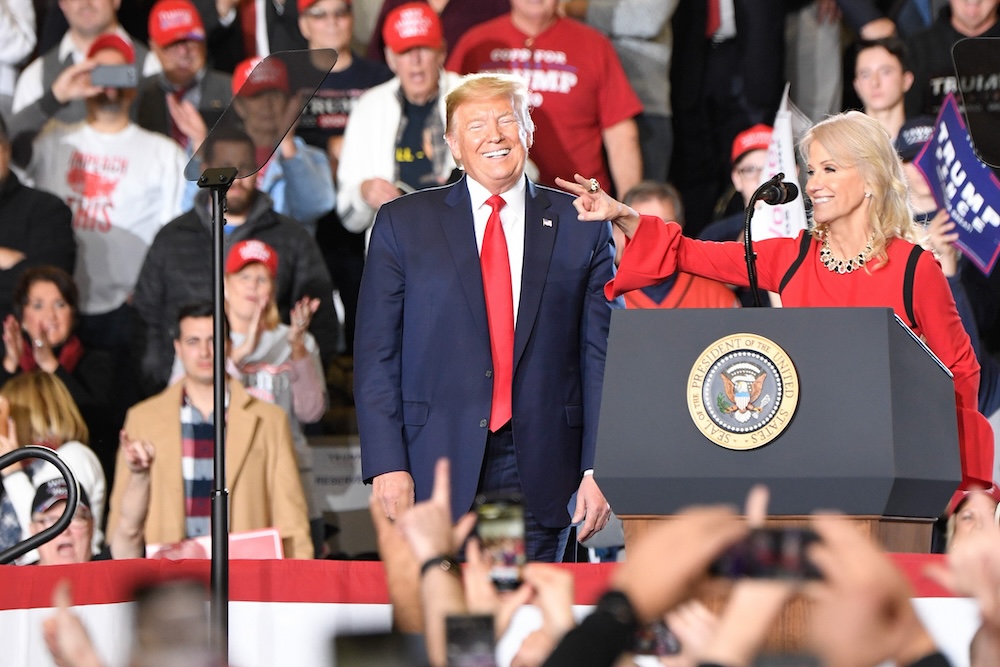Politics
Kellyanne Conway Raises Eyebrows With New Insights On Trump ‘Veepstakes’

In an opinion piece for The New York Times, Kellyanne Conway, a former senior counselor to President Donald Trump, delved into the intricacies of selecting a vice-presidential candidate for Trump’s potential return to the White House.
Titled “Who Should Be Trump’s No. 2?”, Conway’s essay started the conversation about the strategic considerations behind choosing a running mate. Conway began her essay, “The most important vice-presidential selection question for Mr. Trump is less ‘who?’ than ‘why?'”
Drawing on her extensive experience within Trump’s inner circle, Conway suggested that the selection process should prioritize compatibility, loyalty, and the ability to govern effectively over political calculations designed to win specific demographics or states. She argued that the traditional approach of balancing the ticket geographically or demographically might not hold the same weight in today’s polarized political climate.
“Mr. Trump’s V.P. should help him win and help him govern,” Conway wrote. “With a crisis on the border, economic dissatisfaction, fears about crime, a parents’ rights renaissance and multiple wars and threats across the globe, his deputy must be able to navigate chaos and challenges at home and abroad.”
“Mr. Trump also needs a No. 2 who can mitigate the damage and turn the tables on one of the few tools left in the Democrats’ arsenal: abortion. Democrats are not winning on the economy, crime, the border or foreign policy, but they have leveraged fear and lies about total opposition to abortion and a national abortion ban — and unforced errors by pro-lifers in state initiatives — to keep the heart of abortion beating strongly.”
The essay touched on the lessons learned from past elections, with Conway pointing out the pitfalls of selecting a running mate who does not fully align with the presidential candidate’s agenda or style. She subtly referenced the tension between Trump and his former Vice President, Mike Pence, especially in the tumultuous aftermath of the 2020 election, to illustrate the importance of ideological and personal harmony between the top two figures on the ticket.
Conway’s essay also challenged the notion that selecting a female vice-presidential candidate is primarily about appealing to female voters based on gender alone. She argued that political success hinges more on shared values and vision than on gender, pointing out that despite the majority of voters being women in 2016, Trump was able to win the presidency over Hillary Clinton.
Conway suggested that while there are many qualified women who could stand against Kamala Harris in a debate, the idea of choosing a woman to attract female voters oversimplifies the complex dynamics of voter preferences.
Conway also critiqued the strategy of appealing to moderates and independents through a candidate like Nikki Haley, noting that such approaches may not be as effective as presumed. She stressed the limitations of moderate Republicans and the potential pitfalls of relying on identity politics.
Instead, Conway advised considering a person of color for Trump’s running mate, focusing on the importance of representing the diverse constituents of the America First movement. This strategy is not about playing identity politics but about acknowledging the broad support Trump has garnered among various demographic groups, including significant inroads among Hispanic and African American voters.
She mentioned several potential candidates of color, including Marco Rubio, Tim Scott, Byron Donalds, Wesley Hunt, Ben Carson, and Vivek Ramaswamy.
“But this is Donald Trump. He will keep us all guessing. He could pick one of the above or none of the above,” Conway finished. “His short list will be long and dynamic. One thing he doesn’t need to do is rush this decision.
“Yet it does matter in helping to chart the course of history, beginning with his chances in November, then fixing the chaos and crisis left behind by Mr. Biden and Ms. Harris and eventually passing the baton to a future leader of the movement and center-right coalition he founded nine years ago.”

